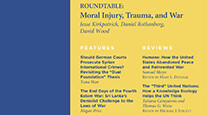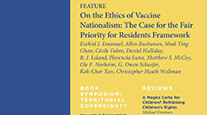In the short story that opens Richard Ned Lebow's stimulating, sobering, and provocative book, Richard Nixon has literally gone to hell. There, the devil, receiving his inspiration from human innovation, has set up an Auschwitz-Birkenau-style concentration camp to torment mass murderers, including Nixon and Pope Pius XII. In the hierarchy of sinners, they belong in the category of most serious offenders who, while in positions of great authority and power, either orchestrated mass murders or failed to halt them even at little risk to themselves.
If international relations scholars are likely to find this beginning unsettling, the entire book is clearly designed to shake core assumptions of mainstream approaches to the study of international relations, and the social sciences in general. Lebow takes aim at contemporary realism and neorealism for failing to offer an analytically useful or morally constructive discourse and theoretical framework with which to formulate national interests and the best ways to pursue them. Charges of conceptual and moral poverty against contemporary realism are not new, but Lebow makes his case with some unlikely allies-Thucydides, Clausewitz, and Morgenthau, the most prominent fathers of realism. His rich and meticulous study of these three classical realists-including an account of their historical context, intellectual setting, personal and professional lives and fortunes-reveals complex thinkers whose insights about the relationship between power, justice, and interest have been tragically lost not only on contemporary foreign policy-makers in the United States but also on the contemporary realist scholarly community that has dominated the study of international relations since World War II.
To Lebow the wisdom of classical realism can be summed up in its exposition and exploration of the tragic vision of politics. Interpreted in the framework of classical tragedy, Thucydides' account of the Peloponnesian War reveals Athens's downfall to be a product of its past success, overconfidence, and consequent miscalculations. By undercutting conventions and the sense of community in its pursuit of power and expediency, Athenian hegemony sowed the seeds of its own ruin. Carl von Clausewitz's tragic sensibilities are apparent in his recognition of the gap between war in theory and war in practice, a consequence of the role of chance and emotions in limiting human agency and rationality. His endorsement of a defensive foreign policy stemmed from his recognition that technological developments in weaponry coupled with the popular nationalism of democratic states such as Revolutionary France would propel warfare toward extreme destructiveness. Hans J. Morgenthau's appreciation of tragedy is clear from his conclusion that the nightmares of the twentieth century were products of modernity's misplaced faith in reason that blinded well-meaning political agents to the "tragic antinomies" of life. The advent of nuclear weapons convinced Morgenthau that human security would depend on "the moral quality of leaders and their willingness to place the common goal of survival over the pursuit of unilateral advantage" (p. 235).
Although Lebow emphasizes that "tragedy encourages us to confront our frailties and limits and the disastrous consequences of trying to exceed them" (p. 43), his interpretation of the tragic vision of politics is not to be confused with John Mearsheimer's account of tragedy in world politics, which is that due to "the structure of the international system," which "no one consciously designed or intended," great powers cannot help but adopt a strategy of offensive realism (John J. Mearsheimer, The Tragedy of Great Power Politics [2001], p. 3). Against such a mechanistic view of tragedy that militates against notions of moral and political responsibility, Lebow returns to the classical Greek origins of the concept of tragedy to highlight the importance of human agency and responsibility for preventing and producing political catastrophes. Instead of compartmentalizing knowledge and building firewalls between domestic and international ethics and politics, classical realists understood politics holistically, emphasized the similarities, rather than differences, between domestic and international politics, and acknowledged that "interest and justice are inseparable and mutually constitutive at a deeper level" (p. 275).
Lebow shows that the tragic poverty of contemporary realism and neorealism derives from their exclusive adherence to rational choice theory and positivist approaches to social science that fail to acknowledge both the inherent complexity of the social world and the predictive and explanatory limits of theory. His critique of contemporary realism and social science, however, is not merely an intellectual exercise; throughout the book, he is clearly preoccupied with the potential for a self-made tragedy in the current trajectory of U.S. foreign policy. Although he acknowledges that contemporary realists and neorealists opposed the war in Iraq, and therefore cannot be held responsible for contemporary U.S. foreign policy, "the discourse they sustain is surprisingly influential and illustrates the dangers of divorcing political analysis from ethical discourse" (p. 392). According to Lebow's diagnosis of the current international environment, the United States' worst enemy is not al-Qaeda or any external "axis of evil." Rather, drawing from the lessons of classical realism, Lebow admonishes that "great powers are often their own worst enemies because success and the hubris it engenders encourages actors to see themselves outside of and above their community, and this in turn blinds them to the need for self-restraint" (p. 258). A superpower that views itself as a peerless power quickly loses sight of its own limits, and in failing to support the normative and institutional bases of international community ends up undermining the foundations of its own legitimacy and power, and inevitably provokes hostile resistance.
U.S. hegemony, however, does not have to become such a tragedy. If we return to Lebow's short story, we can appreciate a hopeful and morally constructive aspect of his tragic vision of politics. Lebow could have cast Nixon in a morality play instead of a tragedy; hell as part of a morality play would be a place in which the irredeemably wicked are justly made to suffer for their crimes. This account would have been natural, given Lebow's admission that writing the story was initially a way to express his anger at Nixon's appalling foreign policy. Poignantly, however, Lebow admits that he came to see Nixon as a tragic figure. By embedding hell in a tragic vision of politics, Lebow makes hell a place not so much for administering retribution as for encouraging the moral reflection and learning that makes possible personal and political transformation and redemption. Embracing classical realism's tragic vision of politics thus should lead not to moral despair and resignation but to an acknowledgment, especially by the powerful, of their moral agency and responsibility. In highlighting classical realism's appreciation of tragedy, Lebow redeems realism's intellectual and moral legacy at the same time that he makes clear the need to transform current mainstream approaches to the study of international relations and the social sciences. One can only hope that its very thoroughness does not prevent this work from reaching a wider audience.
-Catherine Lu, McGill University



